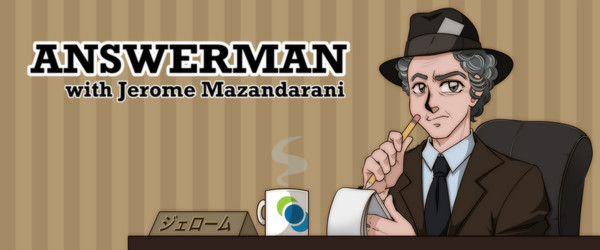Answerman
Defamation Versus Free Speech
by Jerome Mazandarani,

Lawfully curious asks:
A manga artist is suing a woman for defamation based on social media posts she made. Doesn't that violate free speech?
Freedom of speech does not mean freedom from consequences, especially when it comes to defamation and hate speech. In case you were wondering, defamation is the action of damaging someone's good reputation; also known as slander or libel. Defamation laws vary from country to country. In the United States, it's much more difficult to successfully prosecute a defamation case because of the First Amendment. In countries like Japan and the UK, it's easier to prosecute defamation either in civil or criminal cases.
Let's start with a recap of what happened. On October 11, 2024 , a Yahoo! Japan news story reported on lawsuit between the creator of Ranking of Kings, Sōsuke Tōka, and a 30-year-old woman from Kagawa Prefecture, Japan.
In July 2022, the woman posted on X (formerly Twitter), calling Tōka a "pedophile and right-winger." She reportedly made the posts because she believed Ranking of Kings was similar to another manga she liked, and she "wanted to vent my anger."
My understanding is that Toka-san or somebody representing him made a complaint to the authorities concerning the tweets. Narashino Police Station forwarded the case documents to prosecutors on suspicion of defamation. The world now holds its breath to find out the outcome, causing a mass suffocation event, because the wheels of justice move very, very slowly.
Predicting the exact timeline is impossible, but based on Japan's criminal justice system, here's the typical pattern: Once the investigation hands over the case, the prosecutor decides whether to formally indict the woman. This process can take anywhere from weeks to several months. Japan's legal system is known for its high conviction rate, partly because prosecutors hesitate to bring cases to trial unless they're confident of a win.
If the prosecutor decides to indict, the case goes to court. The first hearing is typically scheduled one to two months after indictment. For straightforward cases where defendants admit charges, trials might conclude quickly, sometimes in one or two hearings. However, if the defendant denies charges or the case is complex, trials could last many months, with hearings occurring approximately once a month. That is almost as long as it takes to get an anime Blu-ray slip cover approved by a Production Committee.
So! Regarding "Free Speech" as it pertains to Japanese law: In Japan, defamation can be criminal or civil. Under Japan's Criminal Code, publicly alleging facts that harm another person's reputation is punishable by imprisonment or a fine, regardless of whether the statements are true or false. A key defense is proving the statement is true and relates to the public interest, made for public benefit.
In Japan, the legal system's interpretation of "public welfare" (kōkyōnofukushi) is central to understanding free speech limitations. This concept, found in Articles 12 and 13 of Japan's Constitution, states that fundamental rights must be used "for the public welfare." This has led courts to balance individual rights, such as freedom of expression, against protecting other people's rights and society as a whole.
Japan's Criminal Code (Article 230-2) provides a key defense against defamation charges. A person won't be punished for defamation if the alleged facts relate to the public interest, are made solely for public benefit, or are proven to be true. This creates a public interest defense, but defendants bear the burden of proving their statements are true.
The Japanese legal system doesn't view the "public welfare" clause as a blank check for government speech restriction. Instead, the Supreme Court has developed a case-by-case balancing act, considering speech context, including public interest value, artistic merit, or potential to cause direct harm to public order and others' rights.
In the United States, the First Amendment protects freedom of speech and press. While providing strong protection, it's not absolute. The "public welfare" concept here is framed through "public concern" or "public interest."
In the U.S., when courts assess defamation cases, they first determine whether speech relates to “public concern.” This broad category includes political debate, public policies, and issues of general community interest. The more a statement concerns public matters, the more First Amendment protection it receives.
The U.S. legal system recognizes that free and robust public debate on public concerns is essential for a well-functioning democracy. To foster this debate, the law provides significant "breathing space" for false or inaccurate statements, especially about public figures. The focus is less on statement truth and more on whether speakers acted responsibly. Therefore, unlike Japan's "public welfare" clause, which constitutionally limits rights, the U.S. "public concern" standard is a court-developed legal principle enhancing free speech protections in defamation cases, making it more difficult for public figures to sue for defamation and harder for anyone to sue over statements of public interest.
The case against the woman will likely be evaluated under these Japanese laws, considering whether her statements were factual claims that harmed the manga artist's social standing. In this particular case, the defendant will likely be charged with Criminal Defamation, and courts will balance her expression rights against Tōka's reputation rights.
Do YOU have a question for the Answerman?
We'd love to answer your questions and especially encourage questions inspired by recent news and headlines.
However, READ THIS FIRST:
● CHECK THE ARCHIVES. Over the years, we've answered THOUSANDS of questions and might have already answered yours!
● We cannot tell you if or when a show will get another season, nor can we help you get in touch with any producers, artists, creators, actors, or licensors.
● Only submit your question once.
● We take questions by email only. (Tweeted questions get ignored!)
● Please keep your questions within a paragraph length.
●The email address is [email protected].
Thank you!
discuss this in the forum (6 posts) |